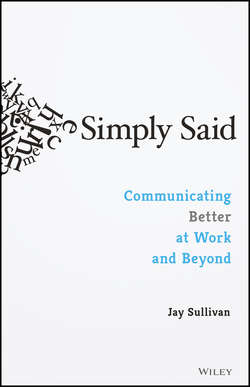Читать книгу Simply Said - Sullivan Jay - Страница 9
На сайте Литреса книга снята с продажи.
SECTION ONE
Your Content
CHAPTER 1
What Do You Mean by That? Conveying a Clear Message
Use Simple Language
ОглавлениеSophisticated professionals fall into two traps. First, we try to show how smart we are. Second, we fail to recognize our industry jargon.
Big words do not impress anyone. Big ideas do. Exec|Comm recently surveyed more than 1,800 business professionals, asking what impresses them about other people’s communication skills. When asked to rank the top three communication skills from a list of dozens of items, not a single person ranked “Using sophisticated vocabulary” as a top-three choice. In a professional setting, you’re not graded on smarts. People assume you are smart. You’re graded on having impact. That means getting people to take action based on your ideas.
Get to your point. Your goal when communicating is not to be cute or clever. Your goal is to be clear.
Messages That Resonate
During the time of Sarbanes Oxley, when risk and regulation were very hot topics in business, I was working with the leadership of a large professional services firm as it prepared for an internal annual meeting.
The partner in charge of the firm’s risk management group was very worried about his message to his partners. He knew they were concerned about their own risk, but also worried about the restrictions that the new regulations would impose on them.
He originally thought the message should be something like: “We must have a strong risk management system in place so that we stay out of jail.” Clearly, this message did not fit our suggested message criteria in that it was:
● Too long and not easily repeatable (17 words)
● More negative than upbeat (albeit somewhat “listener directed”)
After applying our message criteria, his revised message for the meeting became “Let’s actively manage risk so it doesn’t manage us.” His partners heard the message loud and clear but also jumped on board to support risk management’s new policies and procedures.
Lisa Bennis, Former Managing Partner, Exec|Comm
Avoid Jargon
We all spend most of our time interacting with other people who do what we do. As a result, we start to think that our internal dialogue, understood intuitively by our colleagues, is understood by everyone. We forget how much jargon has crept into our vocabulary. Jargon promotes efficiency when used with our colleagues, but it becomes problematic when we fail to recognize it as jargon and use it in inappropriate settings. Challenge yourself – first, to always recognize jargon, and second, to eliminate it when it will get in the way.
Every industry and every discrete function within a company develops its unique jargon. Accountants, lawyers, IT professionals, and HR generalists all use phrases that mean something specific to them and their colleagues. Jargon allows us to be efficient when speaking with others in our field. However, jargon is misconstrued by, or completely unintelligible to, the general population.
Most of the time, we don’t realize we are using jargon. A few years after joining Exec|Comm, I was in Washington, D.C., working with a small group of partners at a law firm. At the start of the day I chatted with a few of the partners to get to know them better. One of them, a litigator, mentioned that he had three grown children. When I asked where they all lived, he responded, “They live in three different venues,” using a legal term that impacts the jurisdiction for a case. Anyone else would have said, “They live in three different cities” or “They live all over the place.” Only a litigator would mention where his kids live based on the county in which he would have to file a lawsuit against them. He didn’t realize how steeped he was in his own jargon.
